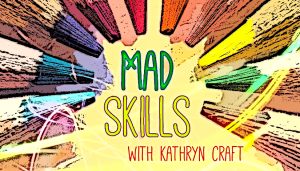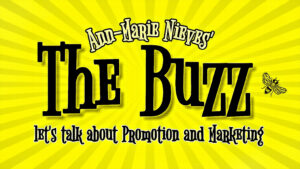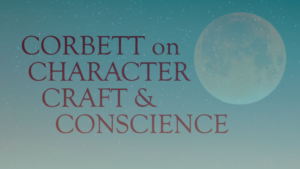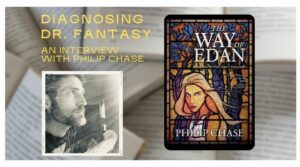Business
There are thousands of posts out there, including a few written by yours truly, on how to market your book. Marketing isn’t a dirty word; it’s just the process of helping people who might want to read your book find your book. There are already more books in the world than any of us could possibly read, with more published every day. So anything you can do to get your book visibility, to make readers aware that it’s out there, that’s a necessary part of the process.
And there’s one marketing tool that every single book has. Yes, yours too. Doesn’t matter whether the book is a classic or a current lead title for a Big Five publisher or a self-published book with no publicity or even a book you haven’t finished writing yet. It costs no money and has no opportunity cost. You only get one, but one should be all you need.
Are you ready to find out what this magical marketing tool is?
It’s your book’s title.
Think about it. Titles are tough, yes, and a good one is no guarantee of success. Not all bestsellers have good titles and a good title doesn’t guarantee a bestseller. But the right one can take your book to the next level. It’s worth spending some time on.
Let’s look at the three most important things your title should do in order to function as a powerful marketing tool:
Describe. Yes, yes, I know. Describing your book is impossible to do in a paragraph, let alone a sentence, let alone a phrase. So there’s no way everything about your book goes into your title. But some level of description is, at core, what we’re all trying to do with a book title. What is your reader going to be reading about? Sometimes one word is enough (Circe, Yellowface) and sometimes more words are needed (Lessons in Chemistry, The Seven Husbands of Evelyn Hugo) but a clue to the content is something every good book title needs.
Associate. Because you get so few words in a title, making them count sometimes means relying on the ones people have existing associations with. This is why approximately 83 gazillion books of the past decade have the word “Paris” in them; a whole lot of people already have thoughts about Paris, and most of those thoughts are positive. If you can incorporate a word that resonates with your potential reader, especially if it’s also descriptive of your book’s content, go for it.
Intrigue. Some book titles work by puzzling the reader. Who is the “you” and who is the “I” and what are the questions in Rebecca Makkai’s I Have Some Questions For You? What in the world happened to Jennette McCurdy for her to publicly declare I’m Glad My Mom Died? Is there literally a support group for horror’s “Final Girls” in Grady Hendrix’s The Final Girl Support Group? Not every book can knock it out of the park like these examples, but a little incongruity or mystery can be just enough to entice a potential reader to look for more information.
Q: How does your book’s title stand up against this test? Does the title do everything you want it to do?
Read MoreIt’s been five years since I posted the last essay here in which I ask why I put myself though the topsy-turvy pursuit of writing fiction. As I said then, I find the process worthy of reexamining because the answers inevitably change. It’s never been truer than it is now, coming up on the one-year anniversary of the publication of my debut. Which means that this time I need to ask myself not just why I’m still writing, but why I should bother to continue my publication journey.
Since it’s occupied most of my attention over the last couple of years, I’ll start with publishing.
My Pub Position
Besides propped at the end of the bar nursing a pint, what is my pub position? For anyone who might be new around here, I should probably start with a brief overview. I write epic fantasy. I worked for over a decade on a trilogy, of which the first edition was my debut. After pursuing a traditional deal for several years, I decided to self-publish. I’d initially planned on having all three books published within a year. That obviously hasn’t happened. There are a variety of reasons for the delay in book two’s arrival, which I’ll leave for another post. The second and third books should appear in fairly short succession, but I’ve learned to not make predictions. Well, not public ones, anyway.
For an overview of the marketplace, mine was one of over four million titles to release in 2022, a year during which book sales were down about 4.5%. The growth of self-publishing has led to an unprecedented number of new books, and the latest tools and resources provide those of us who choose the path with an unprecedented means to offer a quality product. I’m very pleased with the physical quality of my offering. It is far from alone in a sea of gorgeous, enticing fantasy releases.
Beyond having a beautiful book in a sea of beautiful books, how am I doing? I’m going to be totally honest here and say that I don’t know—not exactly. I’ve learned that keeping track of sales data is harmful to my mental health. Doing so undeniably impedes my ability to make progress with anything writing-related. I find anything involving comparison to be particularly adverse to the creative process. Meanwhile, not keeping track of sales data is hardly an astute business practice. There are indicators that can’t be ignored, of course. For example, I have been stunned by the number of you—WU contributors and regulars—who bought, read, reviewed, reached out, and/or recommended my debut. Your support has been phenomenal, and my gratitude is immense and undiminished.
Stepping outside of WU, I have found the SFF self-pub community—avid readers, reviewers, and fellow authors alike—to be warm and inclusive. I’ve met many wonderful folks, and have received no small amount of enthusiastic support. In terms of harnessing support, I can see that the more one invests of themselves, the better they do. For me, online interaction poses a challenge. Too much is definitely not a healthy proposition. Too little, even over short periods, results in swiftly fading from the community’s awareness.
I’ve been seeking my own version of balance. Unfortunately, what feels like balance to […]
Read More
Three years ago, in mid-August, my first historical novel debuted in the summer of lockdown. The launch situation was far from ideal, and those of us who were published that summer did the best we could with bookshops closed and no in-person events. When August 2021 rolled around and my second novel was released along with the paperback version of the first, my expectations weren’t high. Another eerily quiet summer, another novel comes out into the world with a whisper.
The summers of 2020, ‘21, and ‘22 were all about book release and promotion, so there was some structure to my writing/author life. It’s late August 2023 as I write this. Things are better now for publishing authors, and though I don’t have a novel in the pipeline, through two launches I’ve developed a community of fellow writers and supportive readers. I’m celebrating friends’ book launches and live events, and sometimes speaking, mentoring, and teaching.
While my first two novels were coming out into the world, I found it tough to begin a new draft. Here, I should qualify that when my manuscript sold in a two-book deal, I had a completed draft of the second and it was a stand-alone sequel. I have real admiration for authors who crank out a book a year. While promoting a recently published book, I needed to keep that set of characters fresh in my head so I could talk about them when questions were asked (even though all authors answer the same questions multiple times). We hone our sound bites, quips, our interjections of humor, and (especially with historical fiction) we can recall historical dates and events at the drop of a hat. It’s tricky, when you’re interviewed for 45 seconds on live radio and the DJ poses questions like: So, who stars in the movie? The clock is ticking while you hem and haw, trying to remember the names of any under-thirty actors. So I was reluctant to try to bring a new set of characters to life. Plus, the pandemic sucked the creativity from my soul for a while.
For the past year, I’ve been working on a third manuscript on and off. The most recent (fifth) draft is, at present, with an editor. So there’s that waiting-to-hear-comments time, which I am now really good at enduring, as well as the sense of relief that comes with completing specific goals. The fine-tuning of this novel has been slow going, and that’s fine. There’s no deadline. I’m surprised by how nice I’ve been about it—to myself, I mean. I’ve felt fortunate that I’ve been able to move at my own pace with this project. While I work well under the pressure of a deadline, I know now that I couldn’t have written this book in one year. The story needed time to germinate and develop. I like to leave room for historical research to shape my plot, and for my characters to surprise me. Don’t get me wrong, I do still feel a strong drive to get this novel to the finish line. I’ve learned—with no deadline—what my own writing process is, and also, that I need to trust it. That’s worth something, isn’t it?
When asked to choose, I’ve considered myself a hybrid Plotter/Pantser. […]
Read More
When I talk about the writing life, I prefer to focus on the pros, not the cons. After all, highs are so much more fun than lows! When authors craft their bios, they don’t list their rejections, insulting reviews, readings where no readers show up, low sales figures, writers block; they mention awards, best sellers, TV/film adaptations, publications that are perceived as prestigious. And just by my nature, I prefer to encourage, not discourage. So, to focus today on failure may seem a bit off-brand and maybe even unwelcome, from your point of view. But bear with me; I have a purpose!
My last post here at Writer Unboxed was my first after several years’ absence. That being the case, I gave a quick-and-dirty bio to (re)acquaint myself to the community. In it, I told how I’d had a novel (my third, Exposure, 2011) come into the marketplace dead on arrival. Then I went on to talk about that day’s subject: whether obsession is a necessary component in creating compelling fiction. However, amid other things in the post’s comments, someone (Hi, Deb Boone) suggested I should speak to how I overcame failure and went on to write the first of what turned out to be a string of bestsellers. And so I shall, with the hope that in sharing that experience I will in fact encourage others.
I want to also note that I’ve made it my practice to speak candidly about all aspects of the business, money included, having found that too often publishing campaigns, sales figures, and author advances are vaguely discussed or shrouded in secrecy or in some cases even deliberately misrepresented in order to make the author/book appear more successful than they are. This business is too opaque. Knowledge = power.
Now, on with the subject at hand!
Here’s a fact: the writing life is replete with failures, small and large—because unfortunately that’s the nature of creating art for public consumption. Failures are with us at every stage: We start stories we can’t seem to finish. We finish stories, but they’re not good enough, and though we try to fix them, we eventually see they’re unredeemable. We query agents and get rejected. We submit to contests and lose. We have an agent, then go on submission and get rejected. We self-publish but no one buys our book. We get a book deal, but our books are dead on arrival. We sell and publish a fairly successful book, then can’t get another deal.
Opportunities to fail are everywhere, of course, and I have failed at plenty of things that have nothing to do with writing: my 9th grade geometry class; learning to play the trumpet; selling Mary Kay Cosmetics; winning Powerball; and staying married to my first and second husbands—just to name a few. And though I have no issues with any of that now, the truth is that I hate to fail, especially at things that are more or less within my power to effect or control. It’s all too easy for my brain and heart to transmute “I failed at x” to “I am a failure.” Being a failure is very different from having a failure. It feels a lot worse, and is a lot harder […]
Read More
I’ve heard many blanket statements from clients and those shopping for PR and marketing services in the past 25 years:
One that sticks out more recently, is that radio provides no value. The medium is dead they declare; only podcasts really matter.
After having lunch last week with my colleague and friend Terry Cater, co-owner of Playback Producers, a publicity production company for authors, publicists & podcasters, it seemed a good time to address the truth about radio and podcasts with someone in the trenches.
I’ve heard many a time from clients that radio is dead and podcasts are it. In the same breath, clients ask to be on NPR and a good number believe they are a perfect fit for Glennon Doyle’s podcast We Can Do Hard Things? Unpack this for us, Terry.
Radio is alive and kicking! In fact, 8 in 10 Americans ages 12 and older listen to radio – that’s according to recent data released by Nielson Media Research. Your question comes in a timely fashion – August 20th is National Radio Day. There’s a reason this medium gets an entire day of awareness. Radio has survived the test of time and is often considered a trustworthy source of information. While podcasts seem to be all the rage, there are varying degrees of the quality and listenership of the shows. A podcast can be less established with a modest listenership, less regulated, and harder to find stats (especially when it comes time to figuring out your ROI).
With that said, podcasts are great when targeting a certain audience including fiction readers. Podcasts listeners also tend to be book buyers. In general, for a successful PR campaign, I recommend securing both radio and podcasts interviews to promote your book. Radio interviews will get you conversations with hosts who have a reliable audience and established metrics. Podcast interviews are great if you have a target market. Don’t underestimate the power of radio and be specific when going after podcasts.
Who is your ideal client?
Playback Producers’ ideal client is an author who is open to an honest discussion about the interviews we can score and the PR campaign we can produce for you. While we know everyone would like to be on a top show like NPR All Things Considered or Glennon’s podcast, we want a client who will listen to our candid advice on the number and type of shows we can book. This is because not everyone will get interviewed on those coveted shows. It’s always our goal to get you the most exposure possible, but we want to manage your expectations. Playback’s been doing this for almost 20 years, so we can help steer you in the right and fruitful direction.
Read MoreMost aspiring authors and even those among us who have been there, done that, are desirous of the literary Golden Ticket—an agent, preferably a dream agent who ticks off all the things on your ultimate literary wish list. Like Charlie of Chocolate Factory fame when he opened a candy bar to find that shiny gold ticket, countless writers are waiting, wishing, hoping, and crossing fingers and toes to open the email that will allow entry into that exclusive club—the upper echelon of the literary world with an agent by their side to usher them in.
I’m just not one of them.
First a bit of backstory. I’ve had agents, plural. I had one for a few years doing little calorie-counting books with one of the Big 5. But I love telling the story of my second agent just to gauge other writers’ reactions. It was about 16 years ago. My background is in health and nutrition and my day job has been writing about those topics for pretty much my whole career. Another writer in the same field and I got together and wrote a book about nutrition. She had a certain amount of name recognition and we easily got a well-known and respected New York agent, had several in-person meetings with acquisition editors at major publishing houses, there was an auction that ended with a 6-figure advance from one of the Big 5, which even after the agent’s fee and splitting it 50/50 with my co-author, was still 6 figures.
Yeah, I know, right?
My, how times have changed. That would never happen today, of course. Especially with a fiction manuscript from an unknown author. But my point is that I have “been there, done that,” so I know what agent success looks and feels like.
Yes, I’ve queried my fiction. I had my eye on a few agents, who I was certain that if they would take me on, it would spell success. Not the financial windfall of my nonfiction book, but some modicum of success. It was not fun. Any writer who has ever queried knows the obsessive nature of scouring over QueryTracker, keeping Excel sheets of potential agents, checking emails just one more time in case the email arrived in the 5 minutes since you last checked, and the heartbreak of getting form letters churned out to let you know that they “just didn’t connect with the story the way I would have hoped.”
I had no takers, so I queried small publishers.
Jump to present day. My novel, “When Robins Appear,” was published with Red Adept Publishing in 2020 and with more than 1,600 ratings on Amazon, I’m happy as a “pig in mud,” as my southern mother used to say. That’s not to boast, or compare myself to authors getting far fewer or far more, but to show that attracting readers is possible even with a small publisher. Red Adept has accepted a second manuscript for publication, a new book which will be released this coming August. I’m working on novel #3, which I plan to submit to them as well. I have zero desire to subject myself to the slings and arrows of the querying process again. Of course, every writer’s goals, as well as every […]
Read Morephoto adapted / Horia Varlan
Ah, the dreaded cliché. It sneaks into our writing with nary a noise, and yet is received by readers with a resounding clunk.
Most writers go to great lengths to avoid them.
In an interview with Oprah Winfrey, on whose wings Janet Fitch’s debut White Oleander found its well-deserved audience, Fitch said she approached her work like a poet, replacing any combination of words that she’d ever heard before. While this is more effort than many of us are willing to expend, it makes sense from a business perspective. Why should a publisher pay a wordsmith to regurgitate combinations so recognizable that readers are numb to them? We need to do the work of creative writers and come up with word clusters that will snag the reader’s interest and inspire fresh thought.
But to sidestep clichés at all costs is to miss out on a handy tool that’s available to all writers. After all, when we need to drive home a nail, will we refuse the hammer just because it is a simple and easily recognized tool? Consider the following arguments in support of the lowly cliché.
1. Clichés are true. Why else would they be overused? Even the claim that “fiction writers make things up to find out what is true” may now be a cliché, but it rings the bell of truth loud and clear. (“Loud and clear”—I’m on a roll!)
2. Clichés make a convenient placeholder while drafting. If your first draft lacks sparkle due to an overuse of clichés, this simply proves their ubiquity: finding clichés conveniently lined up on the nearest shelf, your mind made good use of them while laying down your story. This is smart. Further innovation at this point would impede the story as it flows from mind to virgin page.
The time to replace worn-out phrases with more evocative language is in later drafts, as Fitch did, when you’re sure that sentence is needed. If the cliché conveys just the right meaning, try refreshing it with a twist. As you would with any edited prose, demand that your twisted cliché create voice, deepen characterization, and/or further plot.
Here’s what Mark Z. Danielewski did to spiff up his prose in an excerpt from the cult classic, House of Leaves. My guess is that this exchange between his narrator and the woman he just met began with inspiration from the Supremes hit, “(Whenever You’re Near) I Hear a Symphony.” (And let’s face it—any song Motown produced in the 60s is probably a cliché today).
“Thank you,” I said, thinking I should kneel.
“Thank you,” she insisted.
Those were the next two words she ever said to me, and wow, I don’t know why but her voice went off in my head like a symphony. A great symphony. A sweet symphony. A great-f***ing-sweet symphony. I don’t know what I’m saying. I know absolutely sh*t about symphonies.
I don’t know whether Danielewski wrote this way from the get-go or if it was in revision that he waxed symphonic. But it was entertaining, right? Even out of context, this riff perfectly evokes the effect this woman has had on the protagonist.
3. Clichés provide a recognizable jumping off point […]
Read MoreIf you’re a fan of epic fantasy or of Fantasy BookTube, our guest today will need no introduction. For the rest of you, Philip Chase is medievalist with a PhD in English Literature. He has taught courses on writing, medieval literature, and fantasy literature, among other things. His special interests include Old English, Old Norse, Middle English, nineteenth-century medievalism, comparative mythology, and fantasy. Other inspirations include time spent in places like Germany, the United Kingdom, Nepal, and the Northeast and Northwest of the United States.
Those of us who are fans of his eponymous YouTube channel, which is dedicated to exploring fantasy literature, have come to know him affectionately as Dr. Fantasy (after a regular segment on his channel). Many of us have also recently come to know him as the author of The Edan Trilogy, which begins with his recent debut, The Way of Edan. I was lucky enough to get an early chance to read, and I can tell you that his expertise and dedication shine through in every sentence of this wonderful book. I’m a fan twice over!
I also had the honor of hosting the discussion below, in an effort to ascertain the root causes—and lifelong consequences—of an affliction I share with today’s interviewee: a fervent love of fantasy. Please help me to welcome Dr. Fantasy himself, Philp Chase, to WU.
Vaughn Roycroft: You and I met in the comments of your YouTube channel. You’ve gained quite a large following there (rightfully so, in this fan’s humble opinion). Can you tell us your Fantasy BookTube origin story, and a bit about how running your channel fits into your writing life? It seems the channel has been a boon to the recent release of your debut. Did you have publication or platform-building in mind from the onset? How do you see the channel fitting into your career going forward?
Philip Chase: My YouTube channel began a little more than three years ago as an attempt to enhance a course I created and had been teaching for years at my college on fantasy literature. In the beginning, I imagined the channel as a forum where my students and I could exchange ideas on readings and on fantasy as a genre. I was completely ignorant of the community of book lovers on YouTube – I had no clue what a “TBR” or “tag video” was – but was delighted to find myself suddenly in the midst of so many people who love the genre that I believe is incredibly rich and deserving of critical exploration. My channel has always been part of the same passion that feeds my teaching, my reading, and my writing. It has turned out to be a lot of work to run a YouTube channel, but it rarely feels like work because of how much I enjoy reading and discussing fantasy literature and writing. Since I recently self-published the first book in a trilogy that I’ve been working on for more than 18 years, the channel has indeed become a boon for getting the word out. I would like to continue the conversations that take place on my channel within the “BookTube” community as a […]
Read More


















